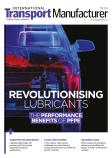Specialised coatings help vehicles beat the heat and resist wear and tear.
Vehicles built today are being asked to hold up to more and more issues to protect the people using them, as well as the vehicle itself. A lot of engineering goes into how to effectively meet new requirements from clients and industry standards. Many times a coating is utilized in to enhance the initial vehicle design. That is the case with 2 unique and innovative coatings manufactured by Seal For Life Industries.
Keeping the heat out
Heat waves are happening with greater frequency throughout the world and bearable working conditions have become unbearable for longer periods of time. As our society has leaned into delivery as more common form of acquiring goods, this has increased the number of workers driving delivery vans daily. While there may or may not be air conditioning in the driver’s cabin, there is usually none in the cargo area. These areas are also predominantly left without insulation, resulting in interior temperatures pushing upwards of 60˚C (140˚F) or hotter.
Seal For Life’s line of Mascoat Thermal Insulating Coatings have been applied to many types of vehicles reduce heat gain from their engines and the sun into interiors for more than 20 years. The coatings are unique in that they incorporate air-encapsulated particles within the coating matrix to effectively reduce the amount of heat that can be transferred through it. By applying the coating on the interior walls and ceiling of the van (ensuring desired branding and aesthetic paint jobs on the exterior), interior temperatures are kept within a few degrees of ambient conditions making them much more comfortable. Since the water-based coating is spray-applied to approximately 1 mm thick, it can be easily installed to even the most complex geometry in a short amount of time.
Standing up to the toughest conditions
Another area that needs to protection are hoppers and storage areas where materials that can scrape, dent, or otherwise damage the metal walls. One company that manufactures street sweepers had been seeing that their hoppers (where the debris from the street sweeping is deposited) were becoming damaged from the high-speed projectiles entering the space from new, more powerful vacuums. Their commitment to quality meant they wanted to improve the durability of the hopper, not reduce the power to the vacuum.
The manufacturer found DuraGard 250 from Seal For Life’s LifeLast line of polyurethane coatings to help them solve this problem. The coating provides flexibility and superior abrasion resistance for the long-term to protect the interior walls from the fast-moving refuse. This means that the street sweepers are not only more effective, they need less maintenance on the hopper so there is not as much vehicle downtime.











